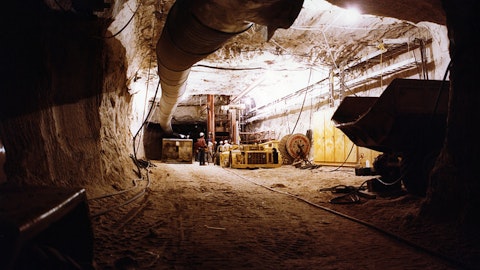All major U.S stock indexes fell on Wednesday, marking the third-consecutive day of sharp losses. The falling energy equities primarily stand behind this disappointing performance, which were in turn affected by increased worries about an oversupply in the commodities markets and sluggish global demand. Nevertheless, a group of corporate insiders ignored the overall direction of equities this week and started piling up more shares of their companies. As a general rule, insider buying activity points to insiders’ confidence in their companies’ stock performance and operational performance over the long-term However, insiders tend to buy shares focusing on their own perceptions on how undervalued or overvalued their companies’ stock is, so one should not overlook the fact that these highly-informed individuals may not be infallible in their own assessments. The Insider Monkey team pinned down three companies that witnessed noteworthy insider buying this week and this article will break down those trades and discuss the performance of the companies in question.
Most investors can’t outperform the stock market by individually picking stocks because stock returns aren’t evenly distributed. A randomly picked stock has only a 35%-to-45% chance (depending on the investment horizon) to outperform the market. There are a few exceptions, one of which is when it comes to purchases made by corporate insiders. Academic research has shown that certain insider purchases historically outperformed the market by an average of seven percentage points per year. This effect is more pronounced in small-cap stocks. Another exception is the small-cap stock picks of hedge funds. Our research has shown that the 15 most popular small-cap stocks among hedge funds outperformed the market by nearly a percentage point per month between 1999 and 2012. We have been forward testing the performance of these stock picks since the end of August 2012 and they have returned 102% over the ensuing 38 months, outperforming the S&P 500 Index by more than 53 percentage points (read more details here). The trick is focusing only on the best small-cap stock picks of funds, not their large-cap stock picks which are extensively covered by analysts and followed by almost everybody.
Solar Capital Ltd. (NASDAQ:SLRC) has seen one of its top executives buy shares this week. Chairman, President, and Chief Executive Officer Michael S. Gross purchased 22,599 shares this week at prices in the range of $17.18-to-$17.50 per share, lifting his direct ownership stake to 135,794 shares. The management investment company’s business primarily involves investing in U.S middle-market companies. More specifically, Solar Capital Ltd. (NASDAQ:SLRC) invests in leverage middle-market companies via senior secured loans, mezzanine loans and equity securities. As a result, the company’s financial performance mainly depends on the current income and capital appreciation in connection with its debt and equity investments. Solar Capital’s gross investment income for the nine-month period that ended September 30 reached $84.1 million, which was down from $89.0 million reported last year. Nevertheless, its gross investment income for the third quarter increased year-over-year to $30.4 million from $28.4 million. Meanwhile, the shares of Solar Capital are nearly 4% in the red so far this year and are trading at a relatively cheap forward price-to-earnings ratio of 9.99, which is substantially below the average of 17.44 for the S&P 500 companies. Israel Englander’s Millennium Management lifted its stake in Solar Capital Ltd. (NASDAQ:SLRC) by 84% during the September quarter to roughly 363,000 shares.
Follow Slr Investment Corp. (NASDAQ:SLRC)
Follow Slr Investment Corp. (NASDAQ:SLRC)
Receive real-time insider trading and news alerts
Let’s head to the second page of this insider trading article, where the insider purchases registered at Covanta Holding Corp (NYSE:CVA) and SM Energy Co (NYSE:SM) are discussed.
Another company that registered a high volume of insider buying this week is Covanta Holding Corp (NYSE:CVA). President and Chief Executive Officer Stephen J. Jones snapped up 20,000 shares on Tuesday at a weighted average price of $14.80 and currently owns 40,444 shares. The CEO also holds an indirect ownership stake of 90,000 shares through his spouse’s trust fund. Furthermore, Michael J. de Castro, Executive Vice President Supply Chain, purchased 10,000 shares on the same day for exactly $15.00 each, boosting his overall holding to 25,677 shares.
The owner and operator of infrastructure for the conversion of waste to energy has had a rough year in terms of stock performance, with its shares declining by 31% year-to-date. Although the company generates most of its revenue from waste disposal, which does not experience substantial price volatility, the revenue generated from the sale of energy and metals (scrap metal is recovered during the waste to energy process) has been subject to high price volatility in 2015. The market pricing for metals has seen substantial pressure from the falling global demand for commodities, which has in turn affected Covanta’s financial performance. Nevertheless, considering the increased focus towards clean energy, Covanta Holding may be well-positioned to experience high growth in the upcoming years. Martin Whitman’s Third Avenue Management holds a 4.29 million-share position in Covanta Holding Corp (NYSE:CVA) as of the end of the third quarter.
Follow Covanta Holding Corp (NYSE:CVA)
Follow Covanta Holding Corp (NYSE:CVA)
Receive real-time insider trading and news alerts
Last but not least, SM Energy Co (NYSE:SM) has seen one of its executives purchase a sizable block of shares this week. David W. Copeland, Executive Vice President, General Counsel, and Corporate Secretary, reported buying 10,000 shares on Tuesday at prices between $22.35 and $23.86 per share. After the recent purchases, the Executive holds 72,279 shares.
The independent energy company that engages in the production of oil, gas, and NGLs has been significantly impacted by the low commodity-price environment. Moreover, the company mainly sells gas at the first-of-the-month price, no matter what the spot price was on the day the gas was produced, which may affect SM’s financial figures if considering the sustained decline in natural gas prices. Most importantly, SM Energy has development in the Eagle Ford shale, Bakken/Three Forks and Permian Basin resource plays, the latter of which is associated with abundant wells and low costs (which may enable the company to endure the current low oil-price environment). SM Energy’s net income for the third quarter fell heavily, to $3.1 million, down from $208.9 million for the same quarter of last year. A total of 22 hedge funds tracked by Insider Monkey were invested in the company at the end of the third quarter, and held 10.50% of the company’s outstanding common stock. Billionaire Paul Singer of Elliott Management cut its exposure to Covanta Holding Corp (NYSE:CVA) by 7% during the July-to-September quarter, to 460,600 shares.
Follow Sm Energy Co (NYSE:SM)
Follow Sm Energy Co (NYSE:SM)
Receive real-time insider trading and news alerts
Disclosure: None





